Business and Corporate Law Report: Contracts, Consumer & Company Law
VerifiedAdded on 2023/06/04
|10
|2873
|358
Report
AI Summary
This report provides a detailed analysis of Australian business and corporate law. It begins with an introduction to the legal framework governing businesses and corporations, including the Corporations Act of 2001 and its significance. Part A focuses on contract law, specifically addressing the doctrine of promissory estoppel in a case involving a loan agreement and business failure. Part B delves into Australian Consumer Law, examining consumer rights and remedies in a case involving a defective vehicle. Part C explores company law, including director's duties and the implications of misleading announcements, referencing relevant case law. It also covers company incorporation and the concept of the corporate veil. The report concludes by summarizing the key findings and legal principles discussed throughout.
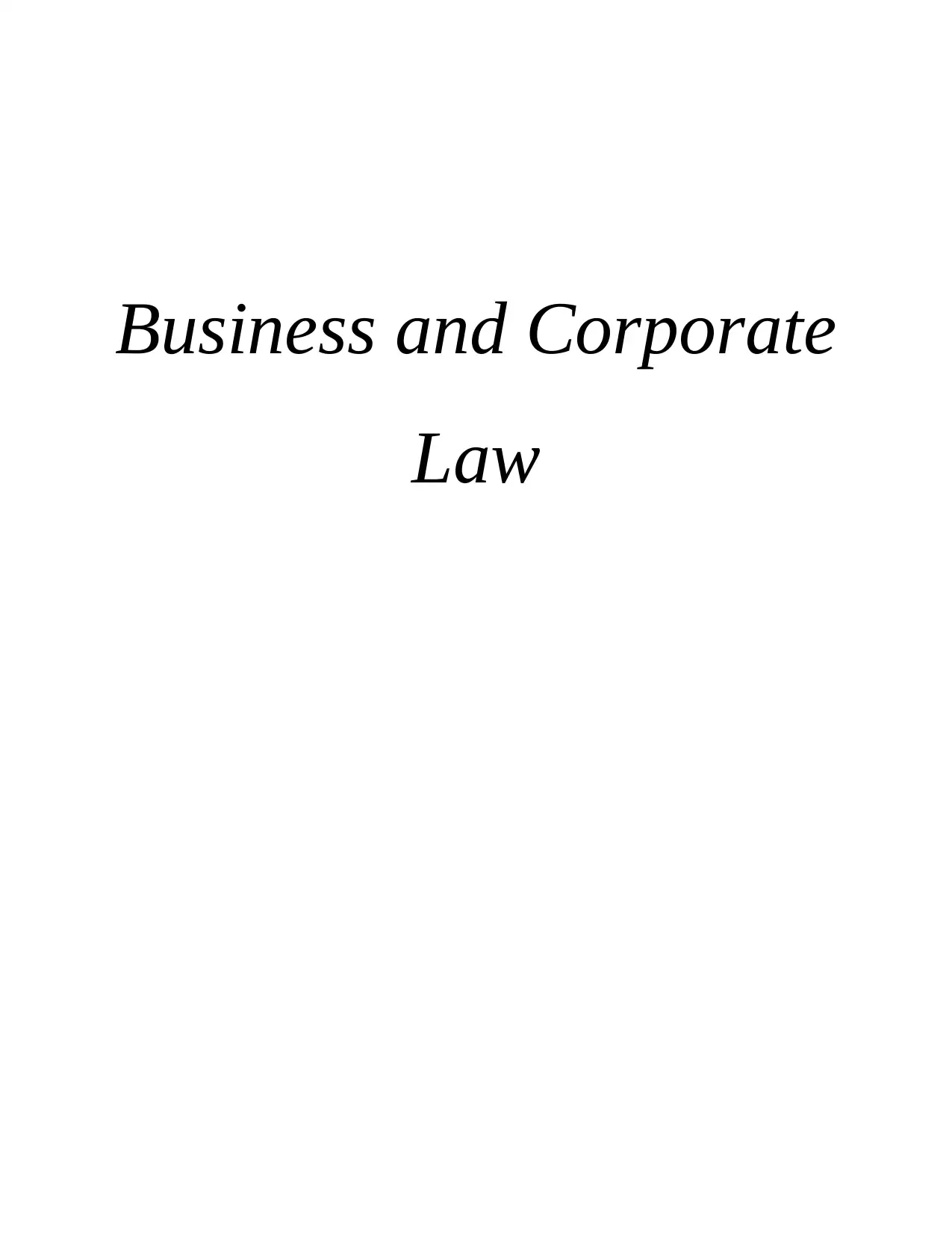
Business and Corporate
Law
Law
Paraphrase This Document
Need a fresh take? Get an instant paraphrase of this document with our AI Paraphraser
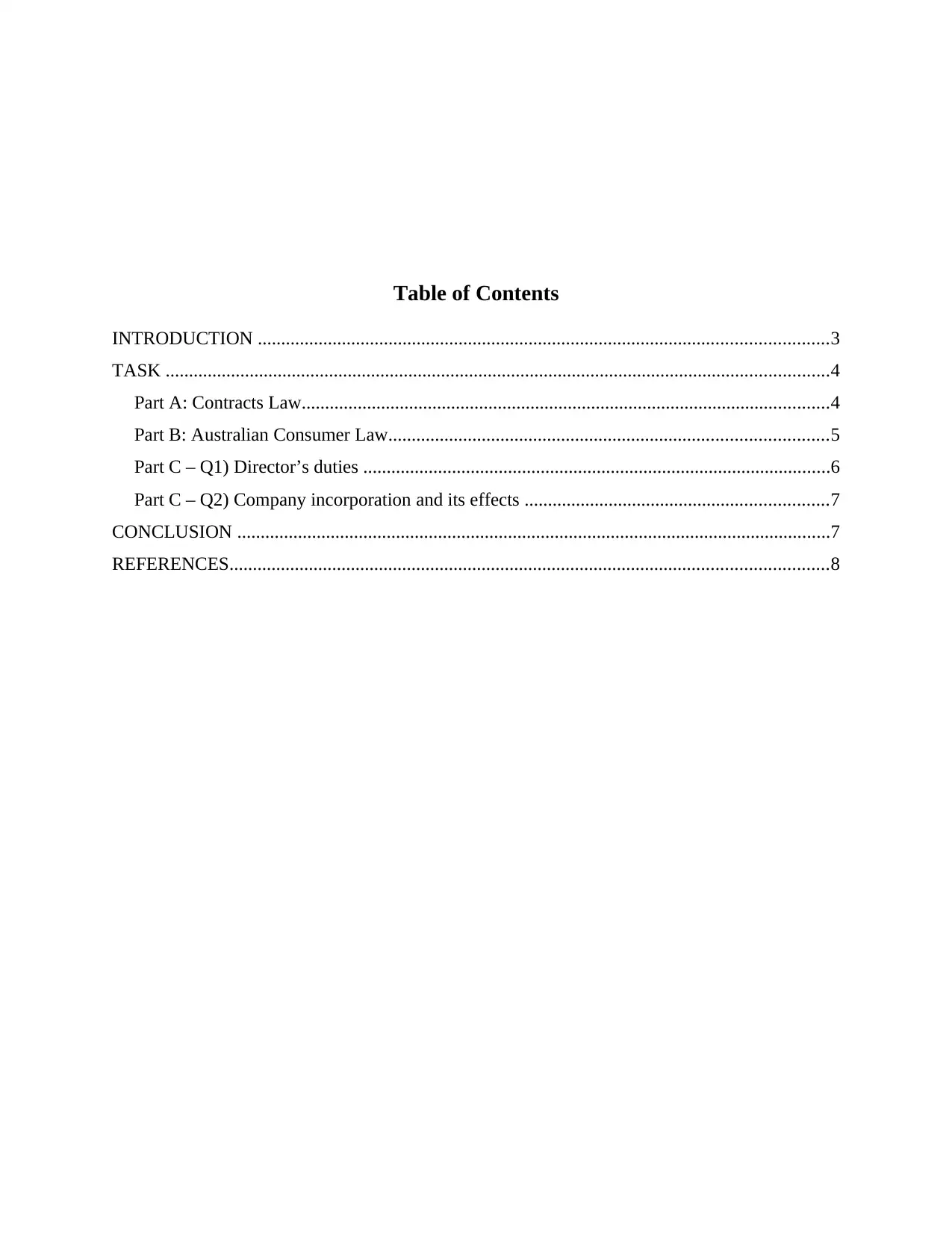
Table of Contents
INTRODUCTION ..........................................................................................................................3
TASK ..............................................................................................................................................4
Part A: Contracts Law.................................................................................................................4
Part B: Australian Consumer Law..............................................................................................5
Part C – Q1) Director’s duties ....................................................................................................6
Part C – Q2) Company incorporation and its effects .................................................................7
CONCLUSION ...............................................................................................................................7
REFERENCES................................................................................................................................8
INTRODUCTION ..........................................................................................................................3
TASK ..............................................................................................................................................4
Part A: Contracts Law.................................................................................................................4
Part B: Australian Consumer Law..............................................................................................5
Part C – Q1) Director’s duties ....................................................................................................6
Part C – Q2) Company incorporation and its effects .................................................................7
CONCLUSION ...............................................................................................................................7
REFERENCES................................................................................................................................8
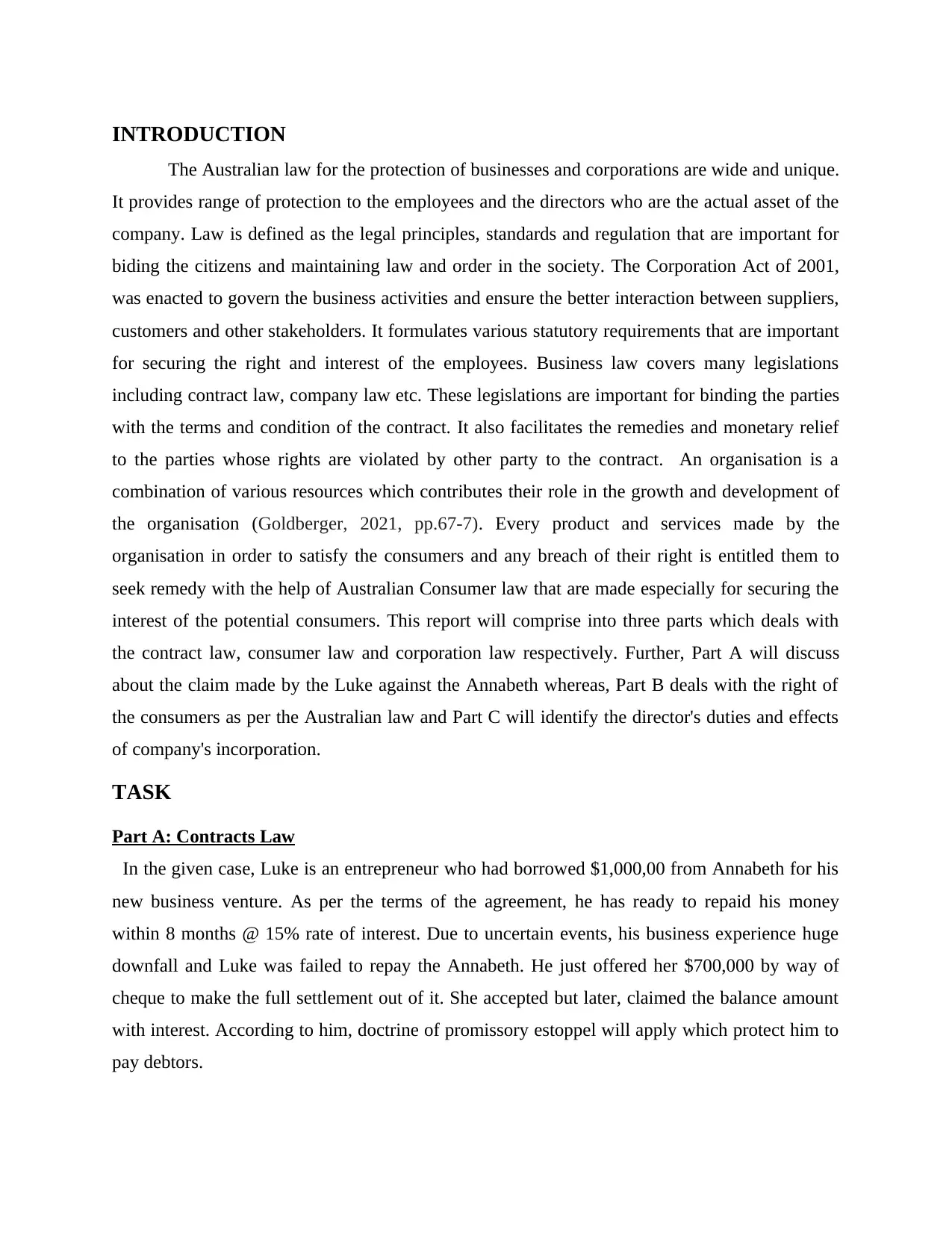
INTRODUCTION
The Australian law for the protection of businesses and corporations are wide and unique.
It provides range of protection to the employees and the directors who are the actual asset of the
company. Law is defined as the legal principles, standards and regulation that are important for
biding the citizens and maintaining law and order in the society. The Corporation Act of 2001,
was enacted to govern the business activities and ensure the better interaction between suppliers,
customers and other stakeholders. It formulates various statutory requirements that are important
for securing the right and interest of the employees. Business law covers many legislations
including contract law, company law etc. These legislations are important for binding the parties
with the terms and condition of the contract. It also facilitates the remedies and monetary relief
to the parties whose rights are violated by other party to the contract. An organisation is a
combination of various resources which contributes their role in the growth and development of
the organisation (Goldberger, 2021, pp.67-7). Every product and services made by the
organisation in order to satisfy the consumers and any breach of their right is entitled them to
seek remedy with the help of Australian Consumer law that are made especially for securing the
interest of the potential consumers. This report will comprise into three parts which deals with
the contract law, consumer law and corporation law respectively. Further, Part A will discuss
about the claim made by the Luke against the Annabeth whereas, Part B deals with the right of
the consumers as per the Australian law and Part C will identify the director's duties and effects
of company's incorporation.
TASK
Part A: Contracts Law
In the given case, Luke is an entrepreneur who had borrowed $1,000,00 from Annabeth for his
new business venture. As per the terms of the agreement, he has ready to repaid his money
within 8 months @ 15% rate of interest. Due to uncertain events, his business experience huge
downfall and Luke was failed to repay the Annabeth. He just offered her $700,000 by way of
cheque to make the full settlement out of it. She accepted but later, claimed the balance amount
with interest. According to him, doctrine of promissory estoppel will apply which protect him to
pay debtors.
The Australian law for the protection of businesses and corporations are wide and unique.
It provides range of protection to the employees and the directors who are the actual asset of the
company. Law is defined as the legal principles, standards and regulation that are important for
biding the citizens and maintaining law and order in the society. The Corporation Act of 2001,
was enacted to govern the business activities and ensure the better interaction between suppliers,
customers and other stakeholders. It formulates various statutory requirements that are important
for securing the right and interest of the employees. Business law covers many legislations
including contract law, company law etc. These legislations are important for binding the parties
with the terms and condition of the contract. It also facilitates the remedies and monetary relief
to the parties whose rights are violated by other party to the contract. An organisation is a
combination of various resources which contributes their role in the growth and development of
the organisation (Goldberger, 2021, pp.67-7). Every product and services made by the
organisation in order to satisfy the consumers and any breach of their right is entitled them to
seek remedy with the help of Australian Consumer law that are made especially for securing the
interest of the potential consumers. This report will comprise into three parts which deals with
the contract law, consumer law and corporation law respectively. Further, Part A will discuss
about the claim made by the Luke against the Annabeth whereas, Part B deals with the right of
the consumers as per the Australian law and Part C will identify the director's duties and effects
of company's incorporation.
TASK
Part A: Contracts Law
In the given case, Luke is an entrepreneur who had borrowed $1,000,00 from Annabeth for his
new business venture. As per the terms of the agreement, he has ready to repaid his money
within 8 months @ 15% rate of interest. Due to uncertain events, his business experience huge
downfall and Luke was failed to repay the Annabeth. He just offered her $700,000 by way of
cheque to make the full settlement out of it. She accepted but later, claimed the balance amount
with interest. According to him, doctrine of promissory estoppel will apply which protect him to
pay debtors.
⊘ This is a preview!⊘
Do you want full access?
Subscribe today to unlock all pages.

Trusted by 1+ million students worldwide
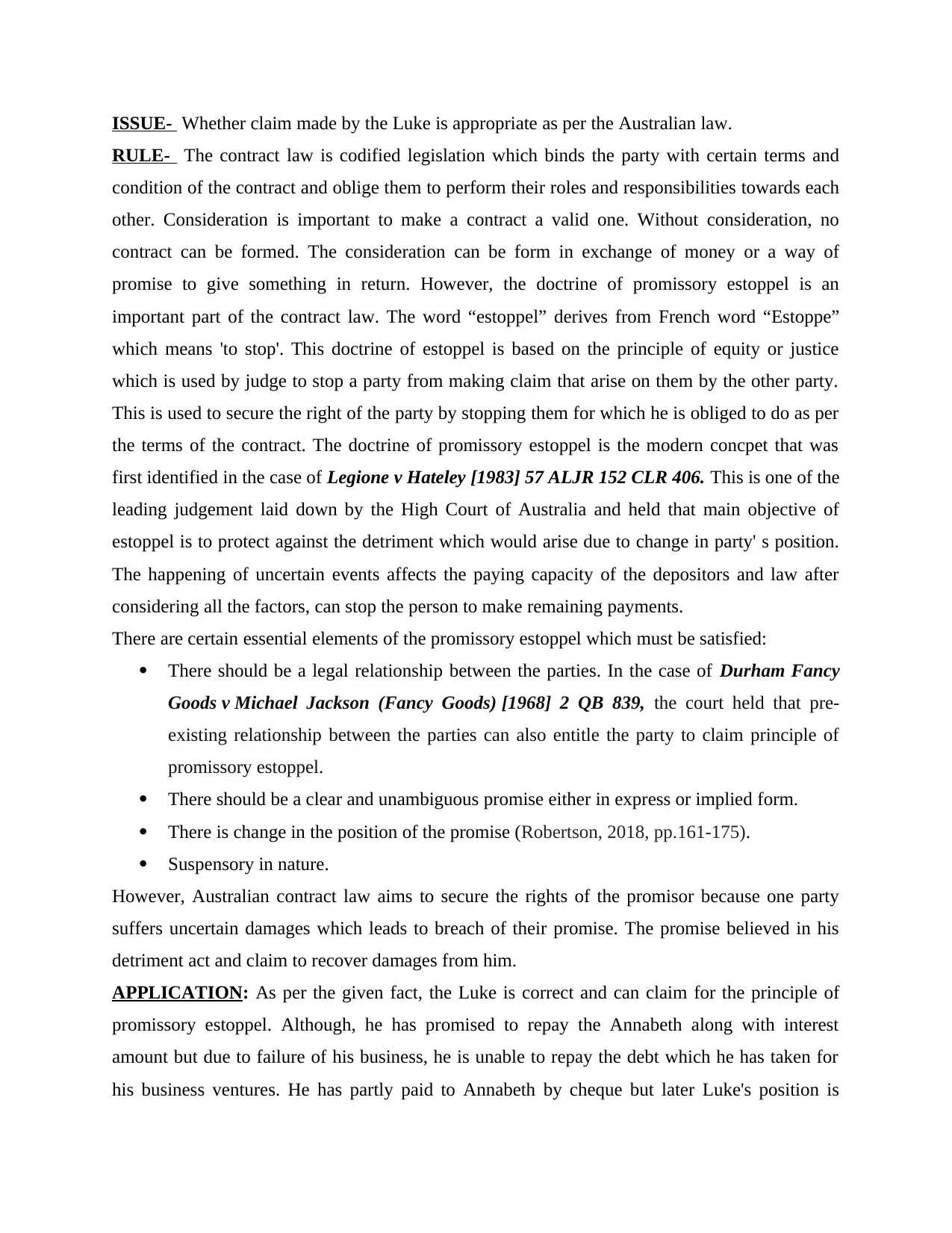
ISSUE- Whether claim made by the Luke is appropriate as per the Australian law.
RULE- The contract law is codified legislation which binds the party with certain terms and
condition of the contract and oblige them to perform their roles and responsibilities towards each
other. Consideration is important to make a contract a valid one. Without consideration, no
contract can be formed. The consideration can be form in exchange of money or a way of
promise to give something in return. However, the doctrine of promissory estoppel is an
important part of the contract law. The word “estoppel” derives from French word “Estoppe”
which means 'to stop'. This doctrine of estoppel is based on the principle of equity or justice
which is used by judge to stop a party from making claim that arise on them by the other party.
This is used to secure the right of the party by stopping them for which he is obliged to do as per
the terms of the contract. The doctrine of promissory estoppel is the modern concpet that was
first identified in the case of Legione v Hateley [1983] 57 ALJR 152 CLR 406. This is one of the
leading judgement laid down by the High Court of Australia and held that main objective of
estoppel is to protect against the detriment which would arise due to change in party' s position.
The happening of uncertain events affects the paying capacity of the depositors and law after
considering all the factors, can stop the person to make remaining payments.
There are certain essential elements of the promissory estoppel which must be satisfied:
There should be a legal relationship between the parties. In the case of Durham Fancy
Goods v Michael Jackson (Fancy Goods) [1968] 2 QB 839, the court held that pre-
existing relationship between the parties can also entitle the party to claim principle of
promissory estoppel.
There should be a clear and unambiguous promise either in express or implied form.
There is change in the position of the promise (Robertson, 2018, pp.161-175).
Suspensory in nature.
However, Australian contract law aims to secure the rights of the promisor because one party
suffers uncertain damages which leads to breach of their promise. The promise believed in his
detriment act and claim to recover damages from him.
APPLICATION: As per the given fact, the Luke is correct and can claim for the principle of
promissory estoppel. Although, he has promised to repay the Annabeth along with interest
amount but due to failure of his business, he is unable to repay the debt which he has taken for
his business ventures. He has partly paid to Annabeth by cheque but later Luke's position is
RULE- The contract law is codified legislation which binds the party with certain terms and
condition of the contract and oblige them to perform their roles and responsibilities towards each
other. Consideration is important to make a contract a valid one. Without consideration, no
contract can be formed. The consideration can be form in exchange of money or a way of
promise to give something in return. However, the doctrine of promissory estoppel is an
important part of the contract law. The word “estoppel” derives from French word “Estoppe”
which means 'to stop'. This doctrine of estoppel is based on the principle of equity or justice
which is used by judge to stop a party from making claim that arise on them by the other party.
This is used to secure the right of the party by stopping them for which he is obliged to do as per
the terms of the contract. The doctrine of promissory estoppel is the modern concpet that was
first identified in the case of Legione v Hateley [1983] 57 ALJR 152 CLR 406. This is one of the
leading judgement laid down by the High Court of Australia and held that main objective of
estoppel is to protect against the detriment which would arise due to change in party' s position.
The happening of uncertain events affects the paying capacity of the depositors and law after
considering all the factors, can stop the person to make remaining payments.
There are certain essential elements of the promissory estoppel which must be satisfied:
There should be a legal relationship between the parties. In the case of Durham Fancy
Goods v Michael Jackson (Fancy Goods) [1968] 2 QB 839, the court held that pre-
existing relationship between the parties can also entitle the party to claim principle of
promissory estoppel.
There should be a clear and unambiguous promise either in express or implied form.
There is change in the position of the promise (Robertson, 2018, pp.161-175).
Suspensory in nature.
However, Australian contract law aims to secure the rights of the promisor because one party
suffers uncertain damages which leads to breach of their promise. The promise believed in his
detriment act and claim to recover damages from him.
APPLICATION: As per the given fact, the Luke is correct and can claim for the principle of
promissory estoppel. Although, he has promised to repay the Annabeth along with interest
amount but due to failure of his business, he is unable to repay the debt which he has taken for
his business ventures. He has partly paid to Annabeth by cheque but later Luke's position is
Paraphrase This Document
Need a fresh take? Get an instant paraphrase of this document with our AI Paraphraser
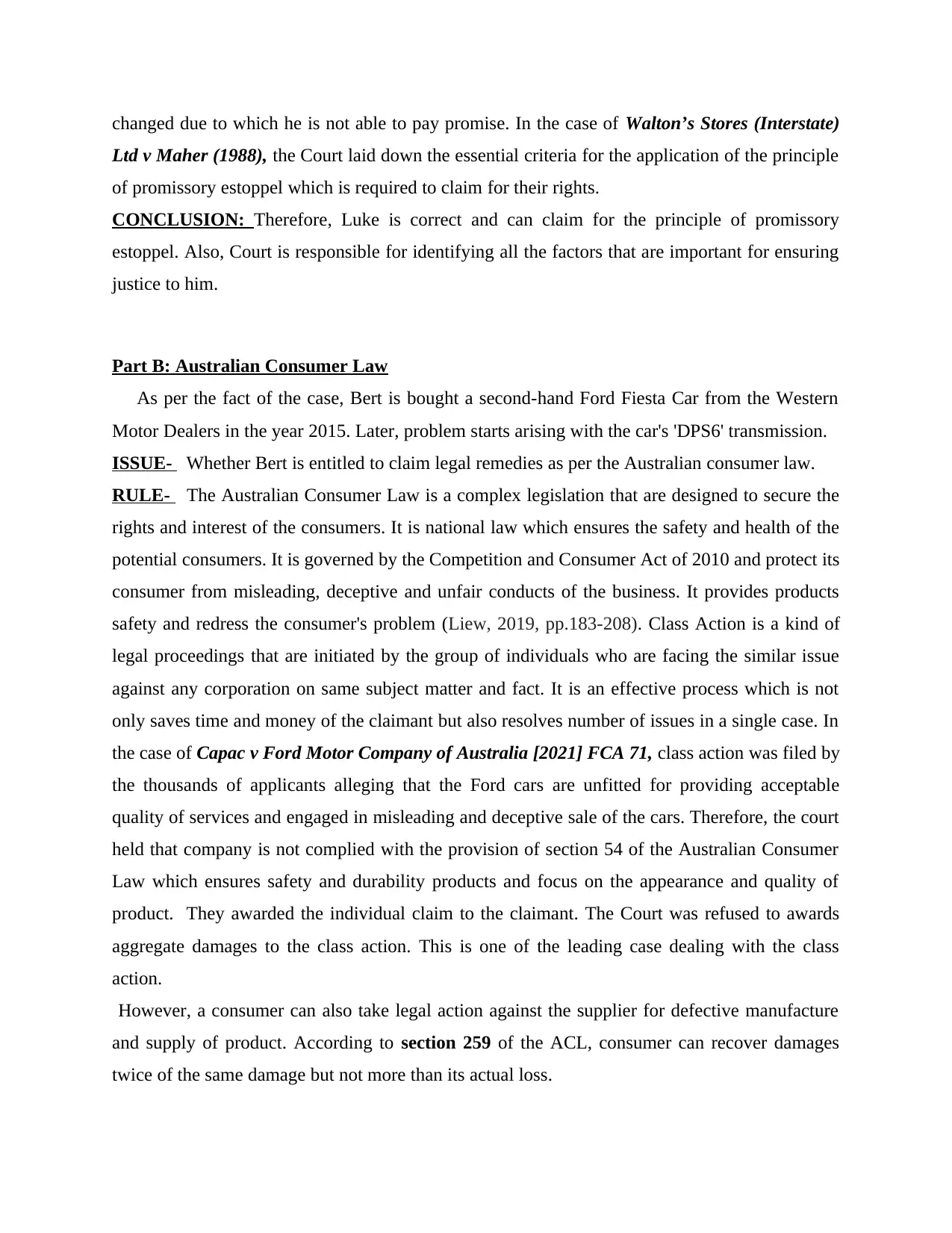
changed due to which he is not able to pay promise. In the case of Walton’s Stores (Interstate)
Ltd v Maher (1988), the Court laid down the essential criteria for the application of the principle
of promissory estoppel which is required to claim for their rights.
CONCLUSION: Therefore, Luke is correct and can claim for the principle of promissory
estoppel. Also, Court is responsible for identifying all the factors that are important for ensuring
justice to him.
Part B: Australian Consumer Law
As per the fact of the case, Bert is bought a second-hand Ford Fiesta Car from the Western
Motor Dealers in the year 2015. Later, problem starts arising with the car's 'DPS6' transmission.
ISSUE- Whether Bert is entitled to claim legal remedies as per the Australian consumer law.
RULE- The Australian Consumer Law is a complex legislation that are designed to secure the
rights and interest of the consumers. It is national law which ensures the safety and health of the
potential consumers. It is governed by the Competition and Consumer Act of 2010 and protect its
consumer from misleading, deceptive and unfair conducts of the business. It provides products
safety and redress the consumer's problem (Liew, 2019, pp.183-208). Class Action is a kind of
legal proceedings that are initiated by the group of individuals who are facing the similar issue
against any corporation on same subject matter and fact. It is an effective process which is not
only saves time and money of the claimant but also resolves number of issues in a single case. In
the case of Capac v Ford Motor Company of Australia [2021] FCA 71, class action was filed by
the thousands of applicants alleging that the Ford cars are unfitted for providing acceptable
quality of services and engaged in misleading and deceptive sale of the cars. Therefore, the court
held that company is not complied with the provision of section 54 of the Australian Consumer
Law which ensures safety and durability products and focus on the appearance and quality of
product. They awarded the individual claim to the claimant. The Court was refused to awards
aggregate damages to the class action. This is one of the leading case dealing with the class
action.
However, a consumer can also take legal action against the supplier for defective manufacture
and supply of product. According to section 259 of the ACL, consumer can recover damages
twice of the same damage but not more than its actual loss.
Ltd v Maher (1988), the Court laid down the essential criteria for the application of the principle
of promissory estoppel which is required to claim for their rights.
CONCLUSION: Therefore, Luke is correct and can claim for the principle of promissory
estoppel. Also, Court is responsible for identifying all the factors that are important for ensuring
justice to him.
Part B: Australian Consumer Law
As per the fact of the case, Bert is bought a second-hand Ford Fiesta Car from the Western
Motor Dealers in the year 2015. Later, problem starts arising with the car's 'DPS6' transmission.
ISSUE- Whether Bert is entitled to claim legal remedies as per the Australian consumer law.
RULE- The Australian Consumer Law is a complex legislation that are designed to secure the
rights and interest of the consumers. It is national law which ensures the safety and health of the
potential consumers. It is governed by the Competition and Consumer Act of 2010 and protect its
consumer from misleading, deceptive and unfair conducts of the business. It provides products
safety and redress the consumer's problem (Liew, 2019, pp.183-208). Class Action is a kind of
legal proceedings that are initiated by the group of individuals who are facing the similar issue
against any corporation on same subject matter and fact. It is an effective process which is not
only saves time and money of the claimant but also resolves number of issues in a single case. In
the case of Capac v Ford Motor Company of Australia [2021] FCA 71, class action was filed by
the thousands of applicants alleging that the Ford cars are unfitted for providing acceptable
quality of services and engaged in misleading and deceptive sale of the cars. Therefore, the court
held that company is not complied with the provision of section 54 of the Australian Consumer
Law which ensures safety and durability products and focus on the appearance and quality of
product. They awarded the individual claim to the claimant. The Court was refused to awards
aggregate damages to the class action. This is one of the leading case dealing with the class
action.
However, a consumer can also take legal action against the supplier for defective manufacture
and supply of product. According to section 259 of the ACL, consumer can recover damages
twice of the same damage but not more than its actual loss.
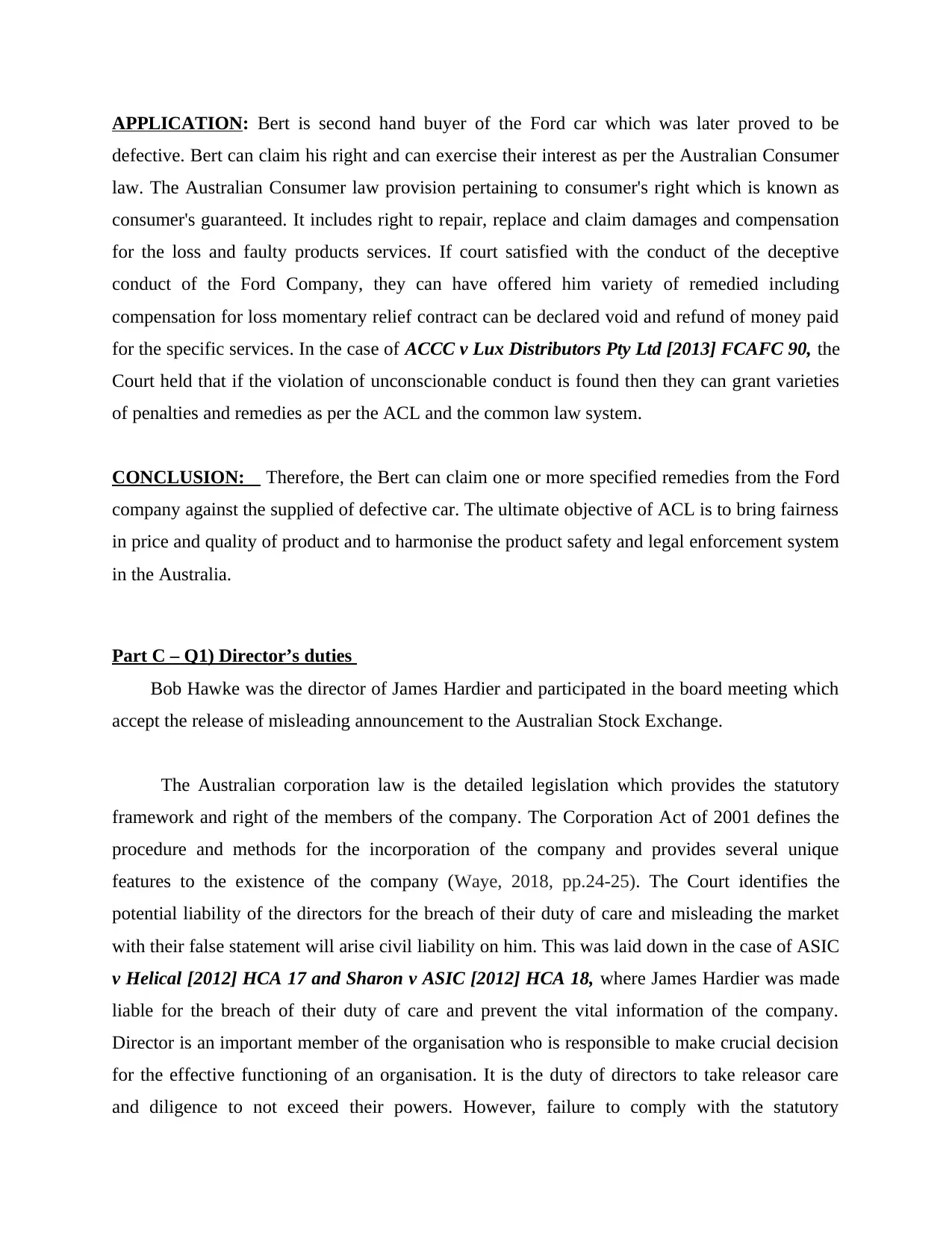
APPLICATION: Bert is second hand buyer of the Ford car which was later proved to be
defective. Bert can claim his right and can exercise their interest as per the Australian Consumer
law. The Australian Consumer law provision pertaining to consumer's right which is known as
consumer's guaranteed. It includes right to repair, replace and claim damages and compensation
for the loss and faulty products services. If court satisfied with the conduct of the deceptive
conduct of the Ford Company, they can have offered him variety of remedied including
compensation for loss momentary relief contract can be declared void and refund of money paid
for the specific services. In the case of ACCC v Lux Distributors Pty Ltd [2013] FCAFC 90, the
Court held that if the violation of unconscionable conduct is found then they can grant varieties
of penalties and remedies as per the ACL and the common law system.
CONCLUSION: Therefore, the Bert can claim one or more specified remedies from the Ford
company against the supplied of defective car. The ultimate objective of ACL is to bring fairness
in price and quality of product and to harmonise the product safety and legal enforcement system
in the Australia.
Part C – Q1) Director’s duties
Bob Hawke was the director of James Hardier and participated in the board meeting which
accept the release of misleading announcement to the Australian Stock Exchange.
The Australian corporation law is the detailed legislation which provides the statutory
framework and right of the members of the company. The Corporation Act of 2001 defines the
procedure and methods for the incorporation of the company and provides several unique
features to the existence of the company (Waye, 2018, pp.24-25). The Court identifies the
potential liability of the directors for the breach of their duty of care and misleading the market
with their false statement will arise civil liability on him. This was laid down in the case of ASIC
v Helical [2012] HCA 17 and Sharon v ASIC [2012] HCA 18, where James Hardier was made
liable for the breach of their duty of care and prevent the vital information of the company.
Director is an important member of the organisation who is responsible to make crucial decision
for the effective functioning of an organisation. It is the duty of directors to take releasor care
and diligence to not exceed their powers. However, failure to comply with the statutory
defective. Bert can claim his right and can exercise their interest as per the Australian Consumer
law. The Australian Consumer law provision pertaining to consumer's right which is known as
consumer's guaranteed. It includes right to repair, replace and claim damages and compensation
for the loss and faulty products services. If court satisfied with the conduct of the deceptive
conduct of the Ford Company, they can have offered him variety of remedied including
compensation for loss momentary relief contract can be declared void and refund of money paid
for the specific services. In the case of ACCC v Lux Distributors Pty Ltd [2013] FCAFC 90, the
Court held that if the violation of unconscionable conduct is found then they can grant varieties
of penalties and remedies as per the ACL and the common law system.
CONCLUSION: Therefore, the Bert can claim one or more specified remedies from the Ford
company against the supplied of defective car. The ultimate objective of ACL is to bring fairness
in price and quality of product and to harmonise the product safety and legal enforcement system
in the Australia.
Part C – Q1) Director’s duties
Bob Hawke was the director of James Hardier and participated in the board meeting which
accept the release of misleading announcement to the Australian Stock Exchange.
The Australian corporation law is the detailed legislation which provides the statutory
framework and right of the members of the company. The Corporation Act of 2001 defines the
procedure and methods for the incorporation of the company and provides several unique
features to the existence of the company (Waye, 2018, pp.24-25). The Court identifies the
potential liability of the directors for the breach of their duty of care and misleading the market
with their false statement will arise civil liability on him. This was laid down in the case of ASIC
v Helical [2012] HCA 17 and Sharon v ASIC [2012] HCA 18, where James Hardier was made
liable for the breach of their duty of care and prevent the vital information of the company.
Director is an important member of the organisation who is responsible to make crucial decision
for the effective functioning of an organisation. It is the duty of directors to take releasor care
and diligence to not exceed their powers. However, failure to comply with the statutory
⊘ This is a preview!⊘
Do you want full access?
Subscribe today to unlock all pages.

Trusted by 1+ million students worldwide
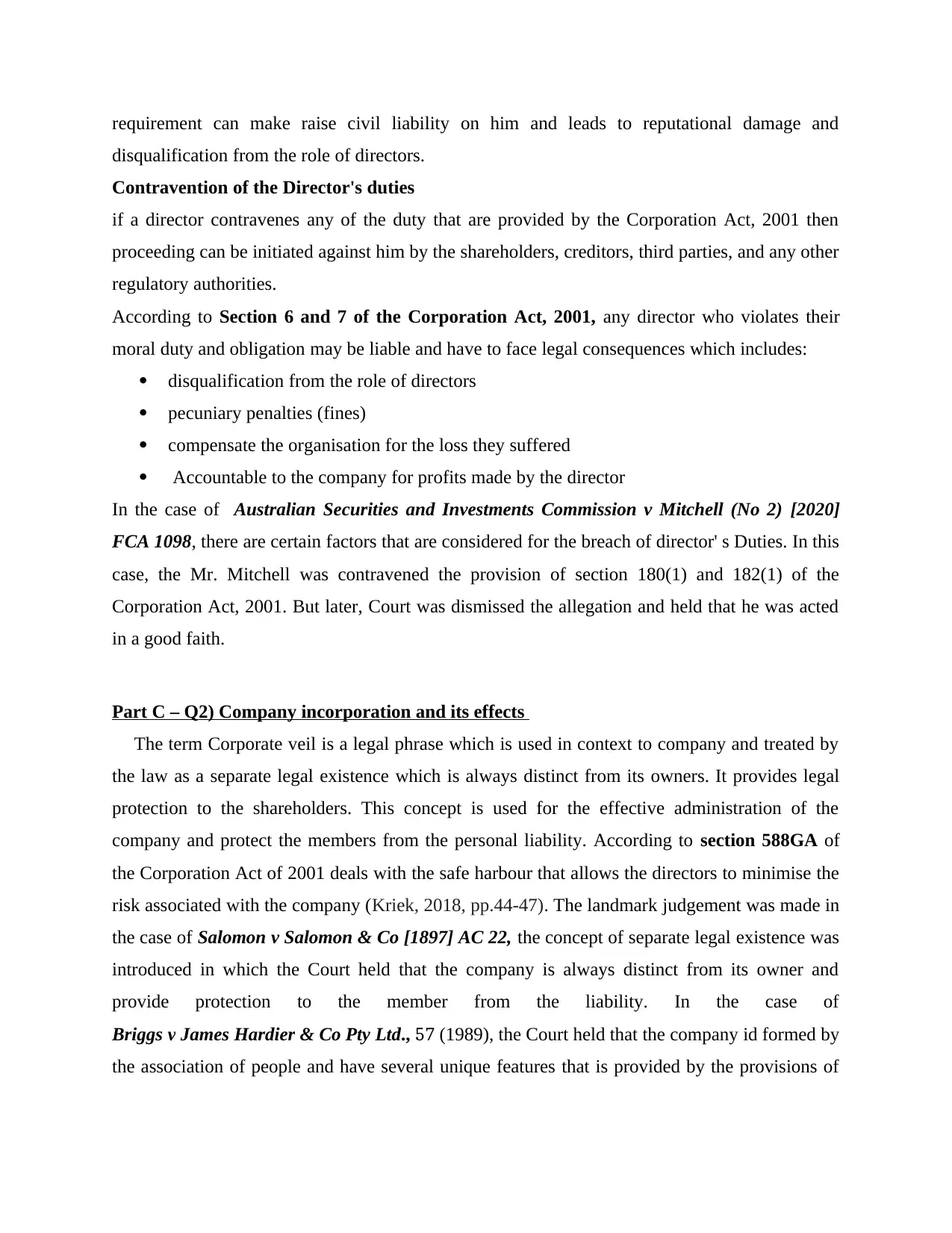
requirement can make raise civil liability on him and leads to reputational damage and
disqualification from the role of directors.
Contravention of the Director's duties
if a director contravenes any of the duty that are provided by the Corporation Act, 2001 then
proceeding can be initiated against him by the shareholders, creditors, third parties, and any other
regulatory authorities.
According to Section 6 and 7 of the Corporation Act, 2001, any director who violates their
moral duty and obligation may be liable and have to face legal consequences which includes:
disqualification from the role of directors
pecuniary penalties (fines)
compensate the organisation for the loss they suffered
Accountable to the company for profits made by the director
In the case of Australian Securities and Investments Commission v Mitchell (No 2) [2020]
FCA 1098, there are certain factors that are considered for the breach of director' s Duties. In this
case, the Mr. Mitchell was contravened the provision of section 180(1) and 182(1) of the
Corporation Act, 2001. But later, Court was dismissed the allegation and held that he was acted
in a good faith.
Part C – Q2) Company incorporation and its effects
The term Corporate veil is a legal phrase which is used in context to company and treated by
the law as a separate legal existence which is always distinct from its owners. It provides legal
protection to the shareholders. This concept is used for the effective administration of the
company and protect the members from the personal liability. According to section 588GA of
the Corporation Act of 2001 deals with the safe harbour that allows the directors to minimise the
risk associated with the company (Kriek, 2018, pp.44-47). The landmark judgement was made in
the case of Salomon v Salomon & Co [1897] AC 22, the concept of separate legal existence was
introduced in which the Court held that the company is always distinct from its owner and
provide protection to the member from the liability. In the case of
Briggs v James Hardier & Co Pty Ltd., 57 (1989), the Court held that the company id formed by
the association of people and have several unique features that is provided by the provisions of
disqualification from the role of directors.
Contravention of the Director's duties
if a director contravenes any of the duty that are provided by the Corporation Act, 2001 then
proceeding can be initiated against him by the shareholders, creditors, third parties, and any other
regulatory authorities.
According to Section 6 and 7 of the Corporation Act, 2001, any director who violates their
moral duty and obligation may be liable and have to face legal consequences which includes:
disqualification from the role of directors
pecuniary penalties (fines)
compensate the organisation for the loss they suffered
Accountable to the company for profits made by the director
In the case of Australian Securities and Investments Commission v Mitchell (No 2) [2020]
FCA 1098, there are certain factors that are considered for the breach of director' s Duties. In this
case, the Mr. Mitchell was contravened the provision of section 180(1) and 182(1) of the
Corporation Act, 2001. But later, Court was dismissed the allegation and held that he was acted
in a good faith.
Part C – Q2) Company incorporation and its effects
The term Corporate veil is a legal phrase which is used in context to company and treated by
the law as a separate legal existence which is always distinct from its owners. It provides legal
protection to the shareholders. This concept is used for the effective administration of the
company and protect the members from the personal liability. According to section 588GA of
the Corporation Act of 2001 deals with the safe harbour that allows the directors to minimise the
risk associated with the company (Kriek, 2018, pp.44-47). The landmark judgement was made in
the case of Salomon v Salomon & Co [1897] AC 22, the concept of separate legal existence was
introduced in which the Court held that the company is always distinct from its owner and
provide protection to the member from the liability. In the case of
Briggs v James Hardier & Co Pty Ltd., 57 (1989), the Court held that the company id formed by
the association of people and have several unique features that is provided by the provisions of
Paraphrase This Document
Need a fresh take? Get an instant paraphrase of this document with our AI Paraphraser
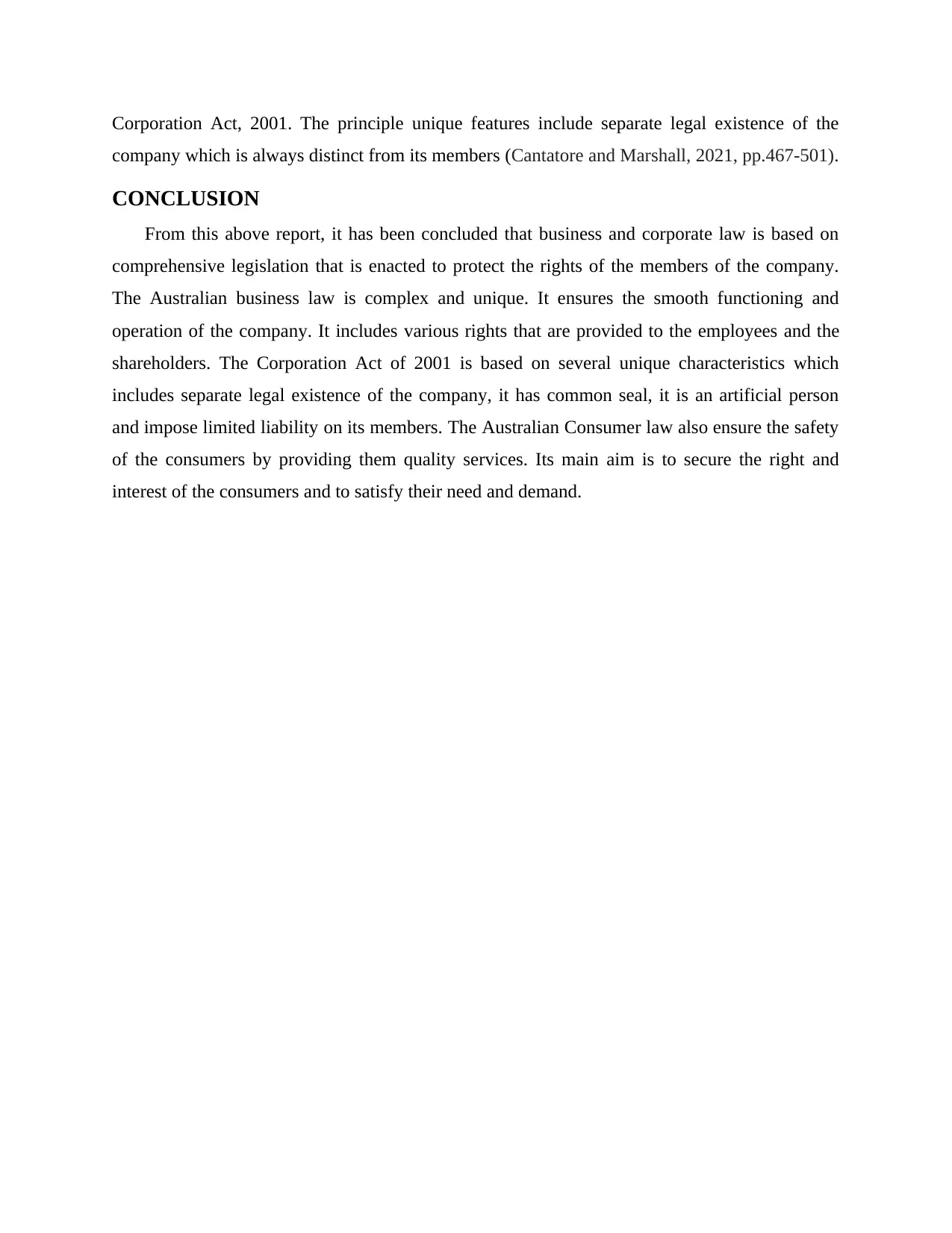
Corporation Act, 2001. The principle unique features include separate legal existence of the
company which is always distinct from its members (Cantatore and Marshall, 2021, pp.467-501).
CONCLUSION
From this above report, it has been concluded that business and corporate law is based on
comprehensive legislation that is enacted to protect the rights of the members of the company.
The Australian business law is complex and unique. It ensures the smooth functioning and
operation of the company. It includes various rights that are provided to the employees and the
shareholders. The Corporation Act of 2001 is based on several unique characteristics which
includes separate legal existence of the company, it has common seal, it is an artificial person
and impose limited liability on its members. The Australian Consumer law also ensure the safety
of the consumers by providing them quality services. Its main aim is to secure the right and
interest of the consumers and to satisfy their need and demand.
company which is always distinct from its members (Cantatore and Marshall, 2021, pp.467-501).
CONCLUSION
From this above report, it has been concluded that business and corporate law is based on
comprehensive legislation that is enacted to protect the rights of the members of the company.
The Australian business law is complex and unique. It ensures the smooth functioning and
operation of the company. It includes various rights that are provided to the employees and the
shareholders. The Corporation Act of 2001 is based on several unique characteristics which
includes separate legal existence of the company, it has common seal, it is an artificial person
and impose limited liability on its members. The Australian Consumer law also ensure the safety
of the consumers by providing them quality services. Its main aim is to secure the right and
interest of the consumers and to satisfy their need and demand.
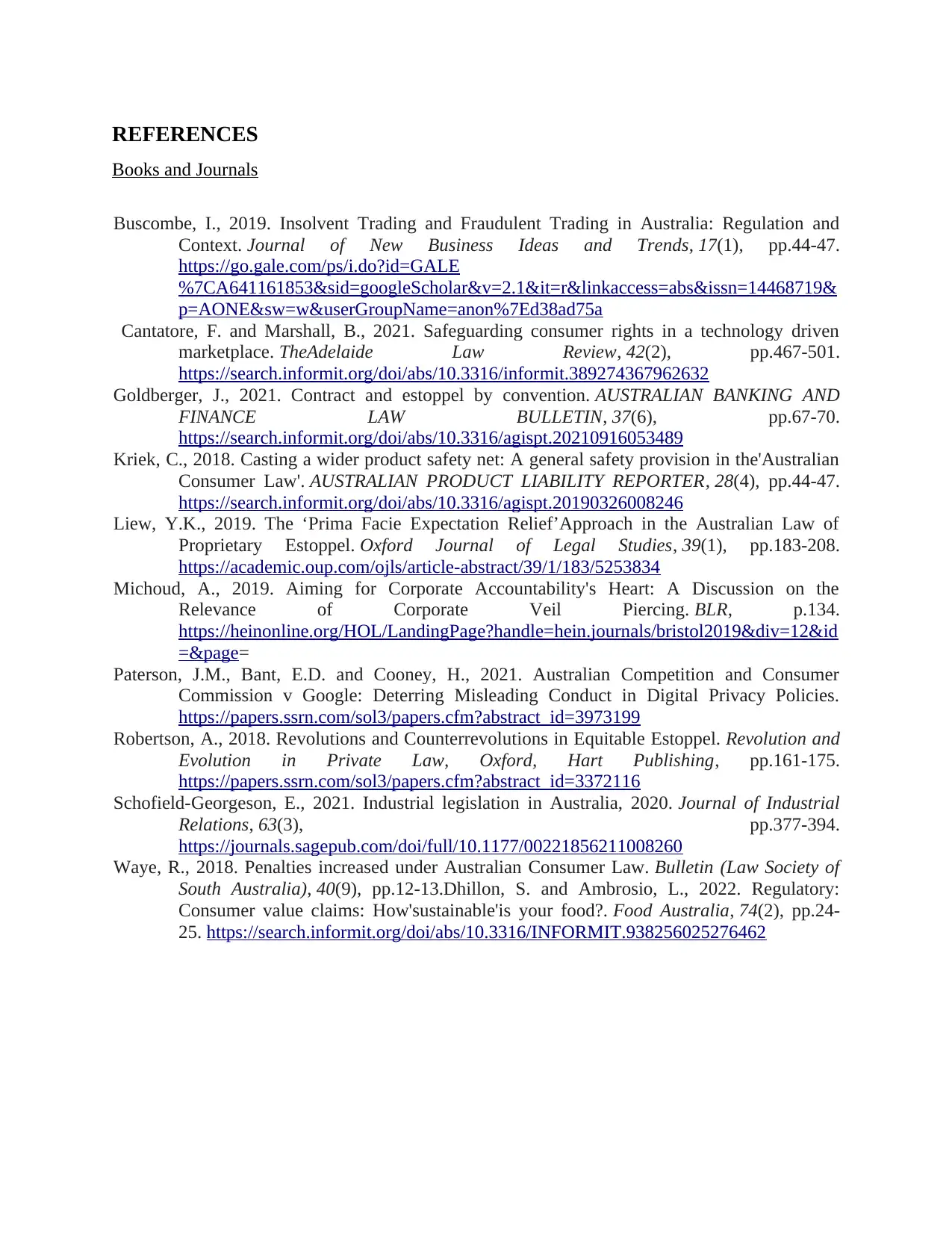
REFERENCES
Books and Journals
Buscombe, I., 2019. Insolvent Trading and Fraudulent Trading in Australia: Regulation and
Context. Journal of New Business Ideas and Trends, 17(1), pp.44-47.
https://go.gale.com/ps/i.do?id=GALE
%7CA641161853&sid=googleScholar&v=2.1&it=r&linkaccess=abs&issn=14468719&
p=AONE&sw=w&userGroupName=anon%7Ed38ad75a
Cantatore, F. and Marshall, B., 2021. Safeguarding consumer rights in a technology driven
marketplace. TheAdelaide Law Review, 42(2), pp.467-501.
https://search.informit.org/doi/abs/10.3316/informit.389274367962632
Goldberger, J., 2021. Contract and estoppel by convention. AUSTRALIAN BANKING AND
FINANCE LAW BULLETIN, 37(6), pp.67-70.
https://search.informit.org/doi/abs/10.3316/agispt.20210916053489
Kriek, C., 2018. Casting a wider product safety net: A general safety provision in the'Australian
Consumer Law'. AUSTRALIAN PRODUCT LIABILITY REPORTER, 28(4), pp.44-47.
https://search.informit.org/doi/abs/10.3316/agispt.20190326008246
Liew, Y.K., 2019. The ‘Prima Facie Expectation Relief’Approach in the Australian Law of
Proprietary Estoppel. Oxford Journal of Legal Studies, 39(1), pp.183-208.
https://academic.oup.com/ojls/article-abstract/39/1/183/5253834
Michoud, A., 2019. Aiming for Corporate Accountability's Heart: A Discussion on the
Relevance of Corporate Veil Piercing. BLR, p.134.
https://heinonline.org/HOL/LandingPage?handle=hein.journals/bristol2019&div=12&id
=&page=
Paterson, J.M., Bant, E.D. and Cooney, H., 2021. Australian Competition and Consumer
Commission v Google: Deterring Misleading Conduct in Digital Privacy Policies.
https://papers.ssrn.com/sol3/papers.cfm?abstract_id=3973199
Robertson, A., 2018. Revolutions and Counterrevolutions in Equitable Estoppel. Revolution and
Evolution in Private Law, Oxford, Hart Publishing, pp.161-175.
https://papers.ssrn.com/sol3/papers.cfm?abstract_id=3372116
Schofield-Georgeson, E., 2021. Industrial legislation in Australia, 2020. Journal of Industrial
Relations, 63(3), pp.377-394.
https://journals.sagepub.com/doi/full/10.1177/00221856211008260
Waye, R., 2018. Penalties increased under Australian Consumer Law. Bulletin (Law Society of
South Australia), 40(9), pp.12-13.Dhillon, S. and Ambrosio, L., 2022. Regulatory:
Consumer value claims: How'sustainable'is your food?. Food Australia, 74(2), pp.24-
25. https://search.informit.org/doi/abs/10.3316/INFORMIT.938256025276462
Books and Journals
Buscombe, I., 2019. Insolvent Trading and Fraudulent Trading in Australia: Regulation and
Context. Journal of New Business Ideas and Trends, 17(1), pp.44-47.
https://go.gale.com/ps/i.do?id=GALE
%7CA641161853&sid=googleScholar&v=2.1&it=r&linkaccess=abs&issn=14468719&
p=AONE&sw=w&userGroupName=anon%7Ed38ad75a
Cantatore, F. and Marshall, B., 2021. Safeguarding consumer rights in a technology driven
marketplace. TheAdelaide Law Review, 42(2), pp.467-501.
https://search.informit.org/doi/abs/10.3316/informit.389274367962632
Goldberger, J., 2021. Contract and estoppel by convention. AUSTRALIAN BANKING AND
FINANCE LAW BULLETIN, 37(6), pp.67-70.
https://search.informit.org/doi/abs/10.3316/agispt.20210916053489
Kriek, C., 2018. Casting a wider product safety net: A general safety provision in the'Australian
Consumer Law'. AUSTRALIAN PRODUCT LIABILITY REPORTER, 28(4), pp.44-47.
https://search.informit.org/doi/abs/10.3316/agispt.20190326008246
Liew, Y.K., 2019. The ‘Prima Facie Expectation Relief’Approach in the Australian Law of
Proprietary Estoppel. Oxford Journal of Legal Studies, 39(1), pp.183-208.
https://academic.oup.com/ojls/article-abstract/39/1/183/5253834
Michoud, A., 2019. Aiming for Corporate Accountability's Heart: A Discussion on the
Relevance of Corporate Veil Piercing. BLR, p.134.
https://heinonline.org/HOL/LandingPage?handle=hein.journals/bristol2019&div=12&id
=&page=
Paterson, J.M., Bant, E.D. and Cooney, H., 2021. Australian Competition and Consumer
Commission v Google: Deterring Misleading Conduct in Digital Privacy Policies.
https://papers.ssrn.com/sol3/papers.cfm?abstract_id=3973199
Robertson, A., 2018. Revolutions and Counterrevolutions in Equitable Estoppel. Revolution and
Evolution in Private Law, Oxford, Hart Publishing, pp.161-175.
https://papers.ssrn.com/sol3/papers.cfm?abstract_id=3372116
Schofield-Georgeson, E., 2021. Industrial legislation in Australia, 2020. Journal of Industrial
Relations, 63(3), pp.377-394.
https://journals.sagepub.com/doi/full/10.1177/00221856211008260
Waye, R., 2018. Penalties increased under Australian Consumer Law. Bulletin (Law Society of
South Australia), 40(9), pp.12-13.Dhillon, S. and Ambrosio, L., 2022. Regulatory:
Consumer value claims: How'sustainable'is your food?. Food Australia, 74(2), pp.24-
25. https://search.informit.org/doi/abs/10.3316/INFORMIT.938256025276462
⊘ This is a preview!⊘
Do you want full access?
Subscribe today to unlock all pages.

Trusted by 1+ million students worldwide

1 out of 10
Related Documents
Your All-in-One AI-Powered Toolkit for Academic Success.
+13062052269
info@desklib.com
Available 24*7 on WhatsApp / Email
![[object Object]](/_next/static/media/star-bottom.7253800d.svg)
Unlock your academic potential
Copyright © 2020–2026 A2Z Services. All Rights Reserved. Developed and managed by ZUCOL.





